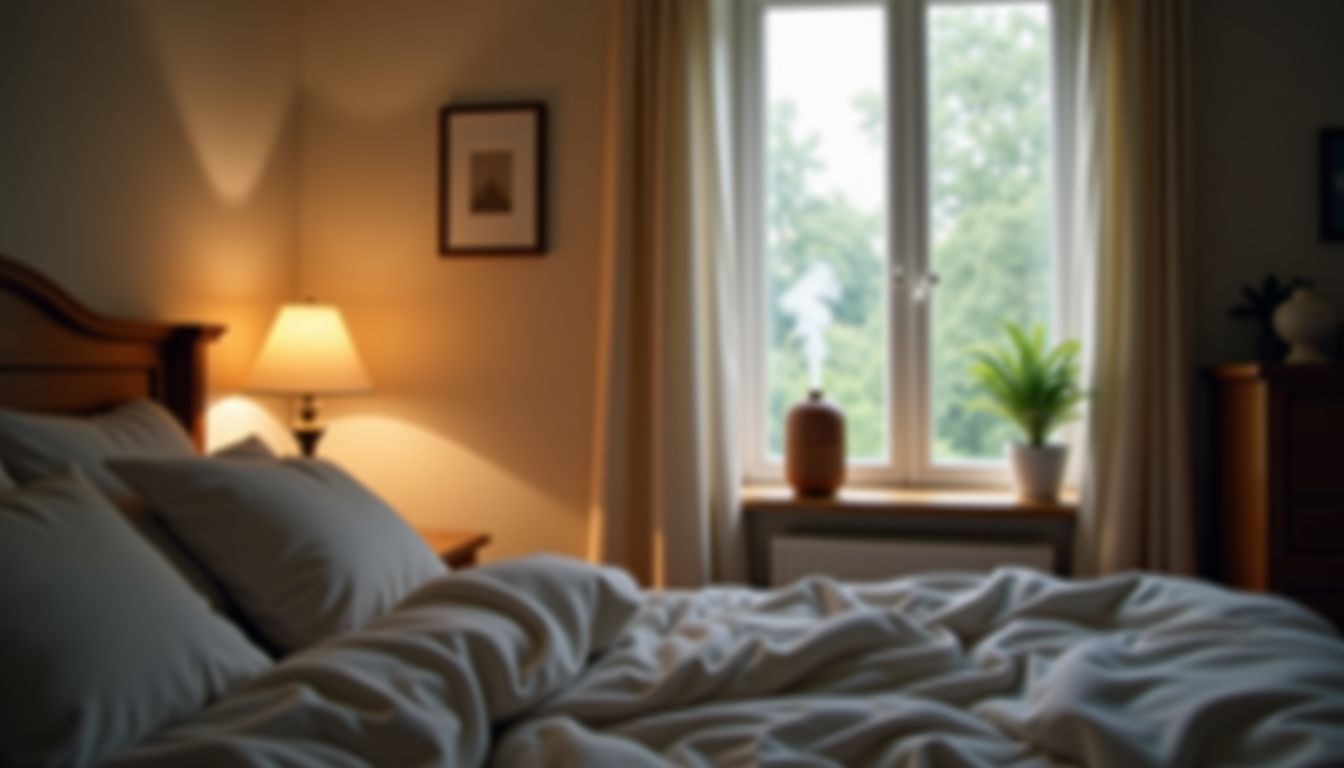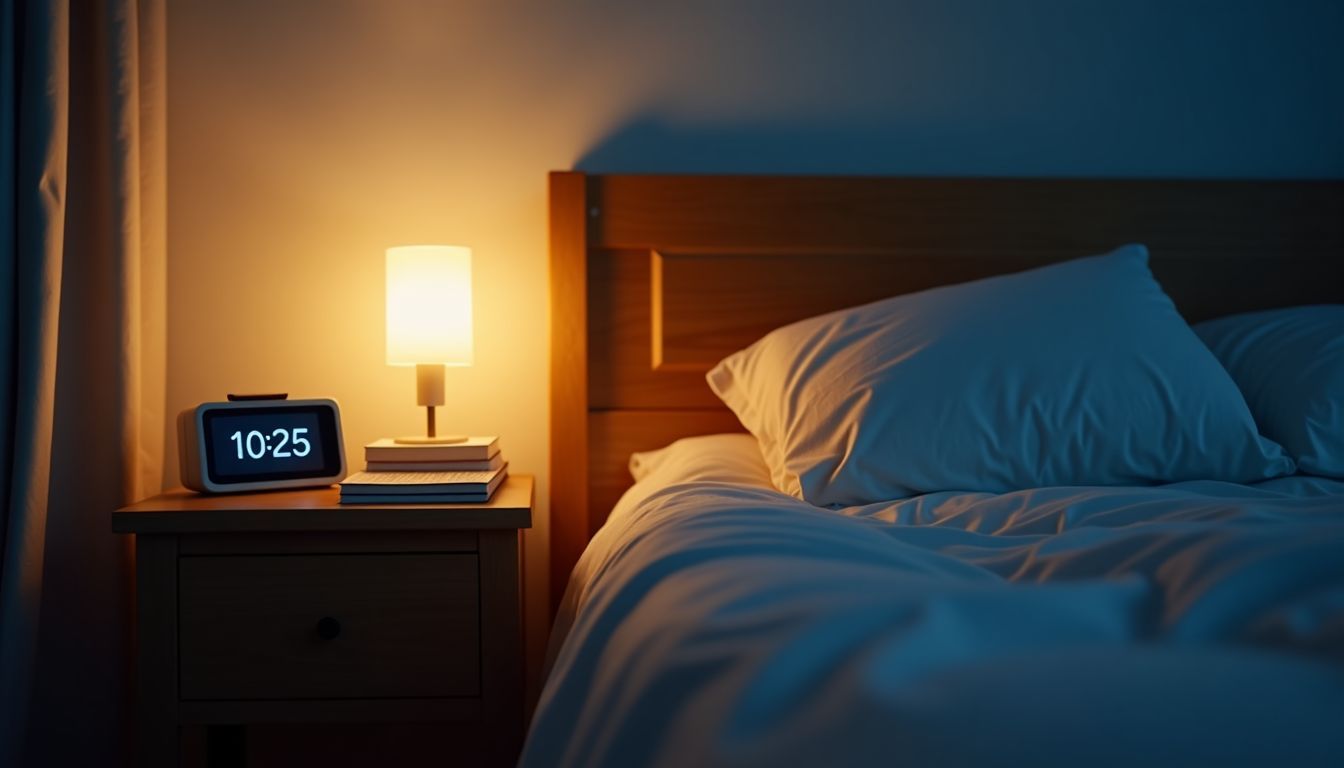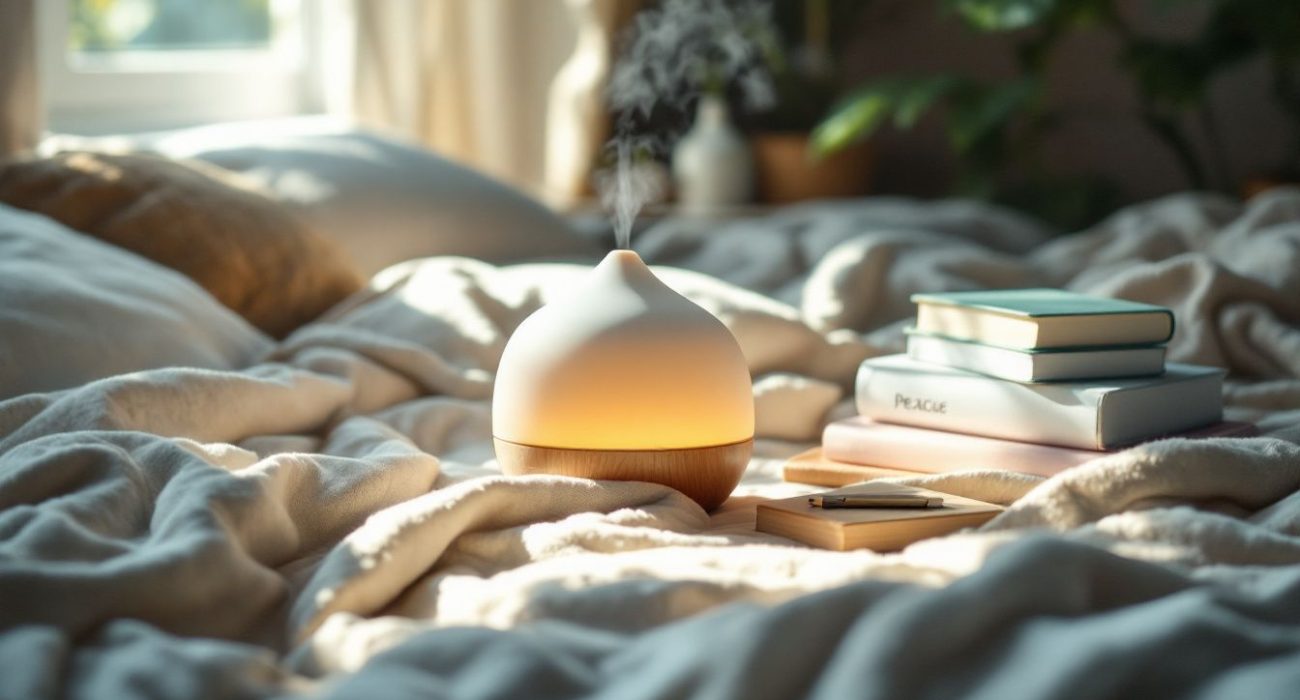Are you having trouble falling asleep? A good bedtime routine for adults can help. This guide will show you how to relax and get ready for bed the right way. Keep reading to sleep better!
Set a Consistent Bedtime

Picking a regular time to go to bed is key. This habit teaches your brain when it’s time to feel sleepy. Use alarms as reminders to stick to this schedule. Even on weekends, try not to change your sleep times too much.
This helps keep your internal clock set right.
Adults need between 7 and 9 hours of sleep each night. About one in three people in the U.S don’t get enough rest, which shows how big a problem poor sleep is. Keeping a steady bedtime improves sleep quality and can make you feel more rested during the day.
Prepare Your Environment

Prepare your sleeping space. Adjust the lighting and room temperature to create a calming atmosphere. Utilize essential oils or aromatherapy to promote relaxation.
Dim the lights
Dimming the lights tells your brain it’s time to relax. Use soft lighting to read before bed. Keep bright lights off near bedtime. This helps with sleep hygiene and prepares you for rest.
Soft light can help improve your sleep patterns. It makes falling asleep easier.
Bright lights disturb your circadian rhythm. They make it hard to fall asleep. Using dimmer switches or low-wattage bulbs is good for nighttime routines. These changes are easy but help a lot with mental health and stress relief by improving how well you sleep at night.
Adjust the temperature
Make your room cool for sleep. Set the temperature between 65-68°F. This range is ideal for sleeping well.
Taking a warm bath helps too. Do this 1-2 hours before bed. It makes your body feel relaxed by copying how your body cools down naturally for sleep.
Use aromatherapy or essential oils
After adjusting the temperature, adding aromatherapy or essential oils can make a big difference. Scents like lavender or cedarwood help you relax and feel calm. You can use these scents in diffusers placed around your room.
Some people even put a few drops of these oils on their pillows for extra relaxation.
Essential oils are not just smells; they work with your mind to help you wind down. Activities like reading or meditating become more relaxing when paired with these soothing scents.
This way, getting ready for sleep becomes a peaceful ritual, making it easier to drift off into good sleep.
Disconnect from Electronics

Disconnecting from electronics before bed is crucial for improving sleep quality and promoting relaxation. To learn more about creating a bedtime routine for adults, read the full blog!
Turn off screens an hour before bed
To sleep better, turn off your screens an hour before bed. Screens give off blue light. This light stops melatonin from working well in your body. Melatonin helps you sleep. Without it, you may find it hard to fall asleep.
So, put away phones, tablets, and laptops early.
Limiting screen time helps too. It makes your mind calm before bed. When you stop using electronics early, your eyes rest from the harsh lights. This can lead to a peaceful night’s sleep without trouble falling asleep or waking up often during the night.
Avoid late-night social media scrolling
Scrolling through social media at night can keep your brain awake. This is because the blue light from screens stops melatonin from being made. Melatonin helps you sleep. Instead of looking at your phone, try other things that help you relax.
Doing relaxation techniques or meditating before bed is a good choice. These activities calm your mind and get it ready for sleep. Turn off all electronic devices an hour before bedtime to avoid blue light and mental stimulation from social media.
This will help you fall asleep faster and sleep better.
Relax Your Body and Mind

To unwind your body and mind, try light yoga or simple stretches. You can also practice deep breathing or meditation to relax further. For more tips on creating a bedtime routine for adults, keep reading our blog.
Stretch or do light yoga
Doing light yoga or stretches helps your body and mind relax before bed. Yoga makes your sleep better by easing the muscle tightness that can make you uncomfortable. This simple activity also stops leg cramps at night.
Foam rolling is another good way to lessen muscle tension and feel calm.
Try poses like adho mukha svanasana, which is a gentle inversion known to refresh the mind. These exercises are not just physical; they involve mindfulness meditation, too. Meditating while stretching guides your thoughts away from daily stress and toward peace, preparing you for sleep.
Practice deep breathing or meditation
After stretching or doing light yoga, you can also try deep breathing or meditation. These methods are great for making your body and mind calm before bed. Deep breathing exercises help lower tension in your body.
They make it easier for you to fall asleep. Meditation is another good way to relax. It reduces stress and makes sleep better.
To do deep breathing, find a quiet spot. Take slow breaths in through your nose, then slowly breathe out through your mouth. Mindfulness meditation involves sitting quietly and paying attention to thoughts, sounds, the feelings in your body without judgment.
Both can be done at home with no special tools needed. They are effective ways to prepare for sleep and improve its quality over time by calming the mind and easing worries that may keep you awake at night.
Engage in Calming Activities
After preparing your environment, engage in calming activities like reading a book or listening to soothing music. These activities can help relax your mind and body before bedtime, leading to better sleep quality.
To read more about creating a bedtime routine for adults, click here.
Read a book
Pick up a simple book before bed. Choose ones that are easy to read and avoid stories that are too exciting. This helps your mind relax. Make sure the room has soft lighting while you read.
This type of light is good for your eyes and keeps your brain calm.
Reading under dim lights helps prepare you for sleep. It’s like telling your body it’s time to rest. So, turning pages can lead you closer to a good night’s sleep, away from racing thoughts and worries.
Listen to soothing music
Moving from reading to listening, calming music can be a potent tool for adults aiming to unwind. Studies have demonstrated its ability to reduce heart rate and lower stress hormone levels, making it easier for individuals to relax and achieve quicker sleep.
Additionally, pink noise, like rainfall or ocean waves, is recognized for its sleep-inducing properties as it masks disruptive environmental sounds. For individuals grappling with insomnia or anxiety-related sleep disruptions, integrating tranquil melodies into their bedtime regimen can significantly enhance their overall sleep quality.
Write in a journal or create a to-do list
Start writing in a journal or make a to-do list before bed. Writing down your thoughts can help organize your mind and improve how quickly you fall asleep, according to the Scullin et al.
(2018) study on pre-sleep writing enhancing sleep onset. So, take some time to jot down what’s on your mind or plan out your tasks for the next day.
Now, let’s move on to creating a hygiene ritual before bedtime.
Create a Hygiene Ritual
Creating a Hygiene Ritual is crucial for preparing physically and mentally for bed. Engage in activities like taking a warm bath or shower, followed by brushing your teeth and following a skincare routine to signal to your body that it’s time to wind down.
Take a warm bath or shower
Bathing or showering with warm water 1-2 hours before bed helps your body relax. It imitates the natural drop in body temperature, making it easier to fall asleep. This soothing ritual can be improved by adding calming essential oils like lavender or chamomile to the water.
The warmth of the bath also assists in muscle relaxation and lowering stress levels, promoting a better night’s sleep.
Engaging in this practice consistently can improve overall sleep quality and help address common issues such as insomnia and difficulty falling asleep. Making it a crucial part of your bedtime routine will signal to your mind that it’s time to wind down and prepare for rest.
Prepare Your Environment is the next step in ensuring a successful bedtime routine.
Brush your teeth and follow a skincare routine
Brushing your teeth before bed helps prevent tooth decay and gum disease. Use a fluoride toothpaste and brush for two minutes. After that, follow a simple skincare routine to keep your skin healthy.
Cleanse your face with a gentle cleanser and apply moisturizer to keep it hydrated. This quick ritual can make a big difference in the long run.
Avoid Common Sleep Disruptors
Limiting caffeine and alcohol before bed helps improve sleep quality. Also, avoiding heavy meals late at night contributes to better rest.
Limit caffeine and alcohol before bed
Avoid caffeine for at least 6 hours before bedtime. It’s advisable to skip heavy meals and alcohol close to bedtime. Light snacks or herbal tea are recommended. Be mindful of the impact of what you consume on your sleep quality.
Avoid heavy meals late at night
Limit consumption of heavy meals late at night since it can disrupt your sleep. Eating large amounts of food before bed may lead to discomfort, indigestion, and heartburn, impacting the quality of your sleep.
Opt for lighter snacks such as cherries, kiwi, yogurt or nuts if you feel hungry before bedtime.
Consider sipping on chamomile or lavender tea as they are known for their calming effects which can promote relaxation and aid in falling asleep easier. These light snacks and soothing teas can be beneficial in ensuring a restful night’s sleep.
Conclusion
In conclusion, establishing a bedtime routine can significantly improve the quality of sleep for adults. Maintaining regular sleep schedules and refraining from using electronic devices before bedtime are essential.
Participating in relaxing activities such as reading or gentle stretching is also beneficial. Attending to the bedroom atmosphere and engaging in relaxation methods are vital in getting ready for a restful night’s sleep.
Keep in mind, these minor practices accumulate to create a substantial impact on enhancing sleep quality.

